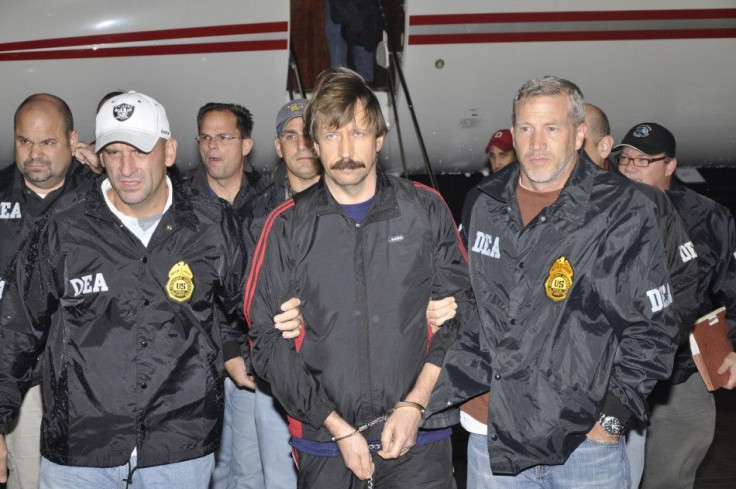Viktor Bout, Alleged 'Merchant Of Death,' Faces Possible Life In Prison Today

Vicktor Bout, a Russian national known as the Merchant of Death for his far reaching arms deals across the world will learn how long he will be in prison on Thursday. His defense attorneys have asked the judge to set him free while United States prosecutor said he should be locked up for the rest of his life.
Viktor Bout, 45, faces a mandatory 25 years in prison with the possibly of life in prison for his conviction of terrorism charges, according to a press release.
As the evidence at trial showed, Viktor Bout was ready to sell a weapons arsenal that would be the envy of some small countries, said United States Attorney for the Southern District of New York, Preet Bharara on Nov. 2, 2011 when Bout was convicted. He aimed to sell those weapons to terrorists for the purpose of killing Americans.
However, Bout's lawyers have asked Judge Shira Schendlin, the presiding judge in the case, to throw out the conviction. They claim that he is a political prisoner who was caught up in a raid by the United States government sting operation, reported the Associated Press. Defense attorneys also said that the officials had coaxed the Russian national from him home in Thailand and was arrested in March 2008.
The relentless pursuit of Viktor Bout and the abominable design to create a criminal case against him that brings him before this court for sentencing is the product of malice and object of private politics stemming from the then White House, defense attorney Albert Dayan wrote in a letter to Scheindlin, reported the AP.
Dayan said that federal authorities acted outrageously in order to make a conviction stick and set-up his client, even after Bout rejected U.S. operatives first attempted sting after the Russian government ordered him to withdraw from illegal arms deals, reported the AP.
But prosecutors are seeking the maximum penalty. They allege that since the 1990s, he has been an international arms trafficker, selling guns to war-torn countries such as Liberia, Rwanda, Angola and the Congo.
In a sting operation that took place between November 2007 and March 2008, Bout allegedly sold millions of dollars' worth of weapons, including 800 surface-to-air-missles, 30,000 AK-47 firearms, 10 million rounds of ammunition, five tons of C-4 plastic explosives, ultralight airplanes outfitted with grenade launchers, and unmanned aerial vehicles, to confidential sources working for the DEA.
The criminal informant informed Bout that he wanted to use the weapons against American personal. This information did not faze the so-called Merchant of Death. He allegedly told the criminal informant that we have the same enemy.
Dayan said that his client faked his way through negotiations, hoping to sell the United States government two cargo planes, not a host of weapons.
Viktor Bout's arms trafficking activity and support of armed conflicts have been a source of concern around the globe for decades, said Attorney General Eric Holder on the day of Bout's conviction.
© Copyright IBTimes 2024. All rights reserved.











